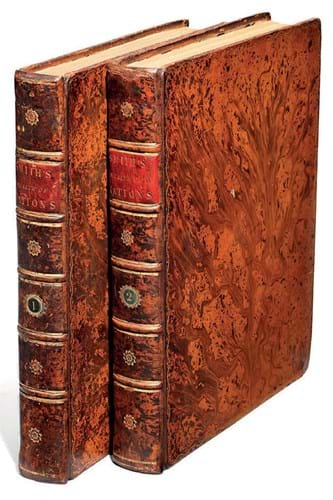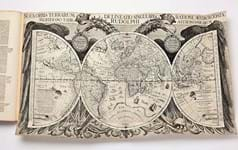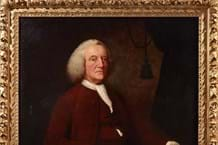Within just the few minutes that it took to sell lots 220-222 in a December 12 sale, Christie’s (25/20/12.5% buyer’s premium) had seen the day’s take increased by well over a million pounds.
The third of those lots, sold at £280,000, was a copy of the 1857, first volume of Karl Marx’s Das Kapital that he presented to a cousin, but the two lots that preceded it focused on Adam Smith and his most famous publication.
An Inquiry into the Nature and Causes of the Wealth of Nations, published in 1776, has been described as the first and greatest classic of modern economic thought and the first major expression of the theory of free trade.
Sold for £750,000 in the King Street sale was Smith’s own copy.
Scottish Enlightenment
Together with his friend David Hume, the author was one of the central figures of the Scottish Enlightenment, but gave up his chair at the University of Glasgow in 1764 to serve as travelling tutor to the third Duke of Buccleuch on the Continent.
Smith’s observations of the workings of absolute monarchy and the ensuing fiscal problems laid the ground for the development of his economic theories, as did meetings with intellectuals such as Voltaire and D’Alembert and economists like Mirabeau and Turgot.
It took him two decades in all to complete the work, but it was immediately hailed as excellent and profound and the first edition was sold out within six months.
Bound for him in characteristically plain and contemporary, possibly Scottish tree calf and bearing Smith’s simple bookplate, this and a second copy (whereabouts now unknown) were recorded by Smith in his own manuscript library catalogue, compiled in 1781.
Smith had no direct descendants and at his death in 1790 his library was bequeathed to a cousin, David Douglas (later Lord Reston), who left it to be divided between his two daughters.
One gave her portion to the library of New College, Edinburgh; the other sister sold part of her portion though James Stillie, an Edinburgh bookseller, but retained others and around 150 volumes were later donated by her son to Queen’s University, Belfast.
It was coming across a copy of The Wealth of Nations in the 1920s that led a later owner of this exceptional copy, Homer N Vanderblue, a professor at Harvard Business School, to embark on building his own enormous Smith collection, one that he donated in 1939 to Harvard.
The 1776 first, however, seems to have been acquired after that date and remained with Vanderblue until the end of his life. By 1988 it had entered the trade and was in a French collection before its acquisition by the European collector who sent it to Christie’s this year.
The other copy known to have been retained by Smith, containing his annotations, was last seen at auction in 1959, when it was acquired at £420 by the economist Piero Sraffa (1898-1983), but its whereabouts are now unknown, says Christie’s.
Future edition
The following lot in the recent Christie’s auction, sold at £110,000, was a letter that Smith sent to his publisher, William Strahan, in November 1776.
The letter, which originally accompanied Smith’s account of the last months of David Hume’s life – published as an appendix to Hume’s own brief autobiography in 1777 – discusses his income from The Wealth of Nations and plans for the next edition.














